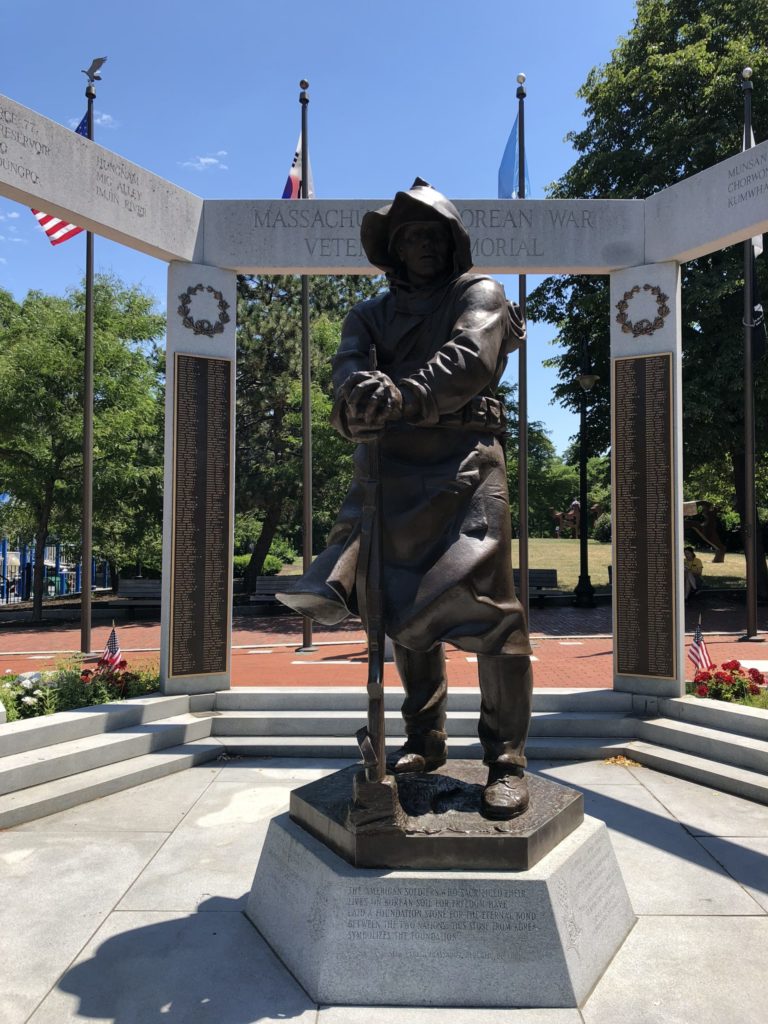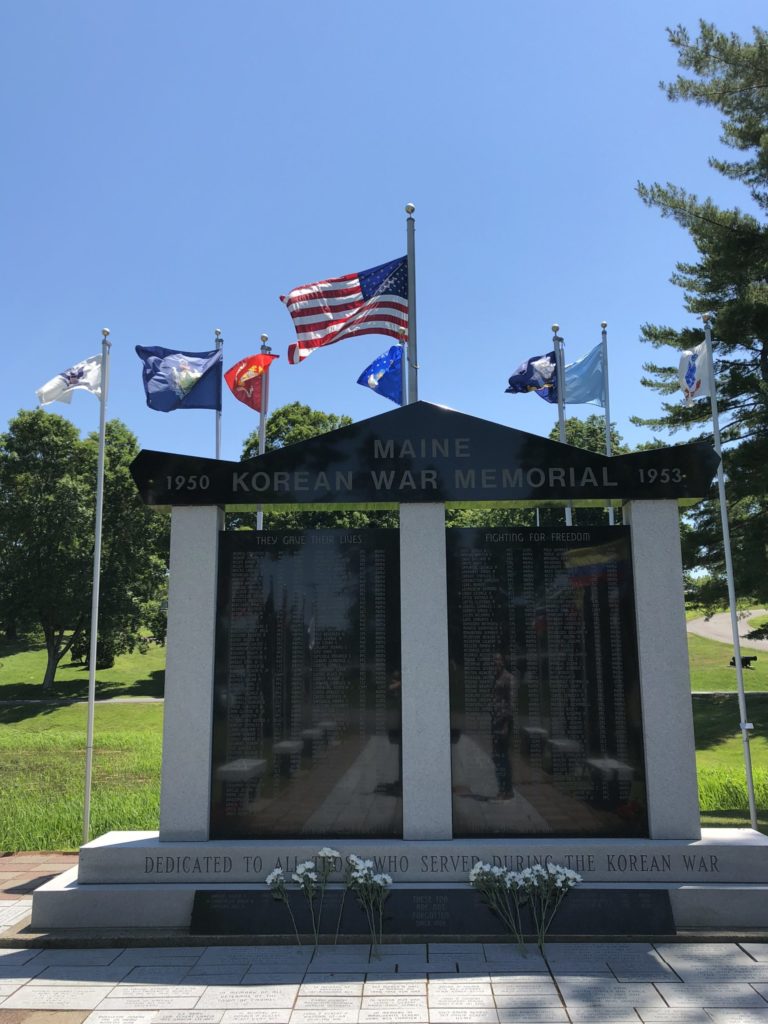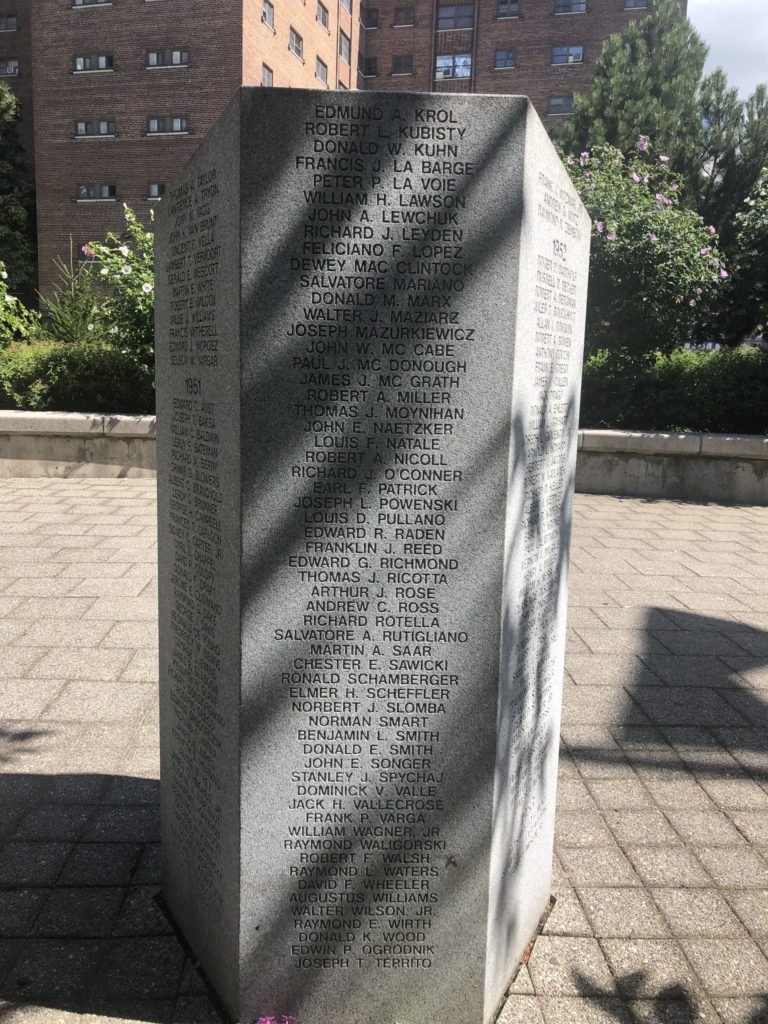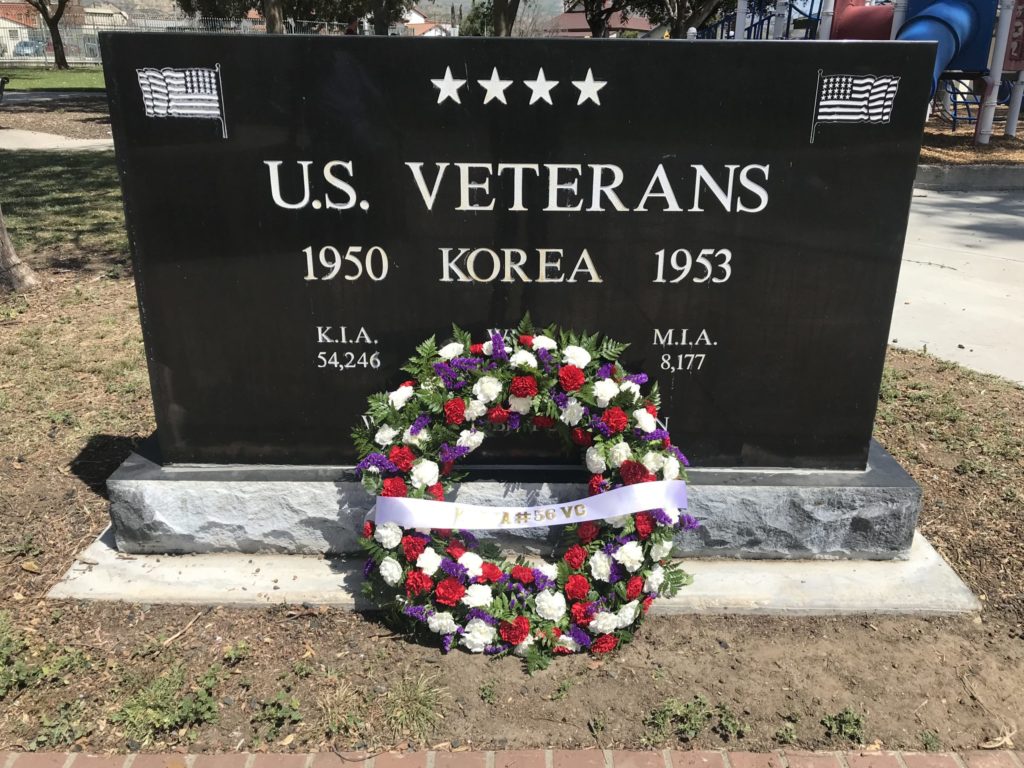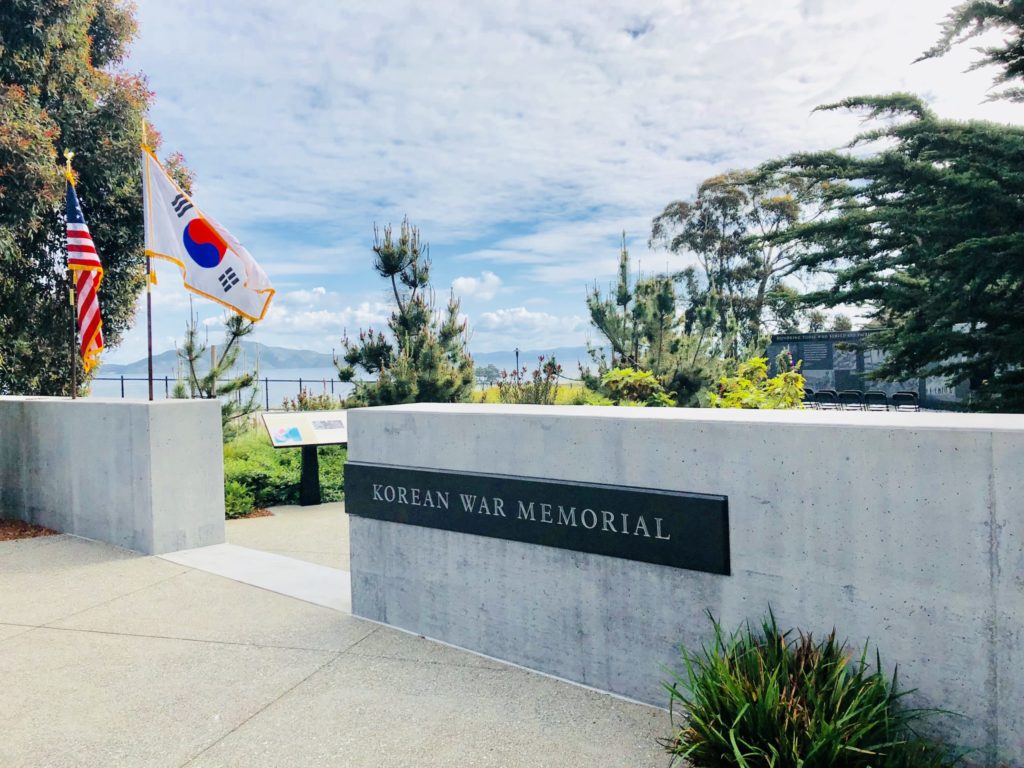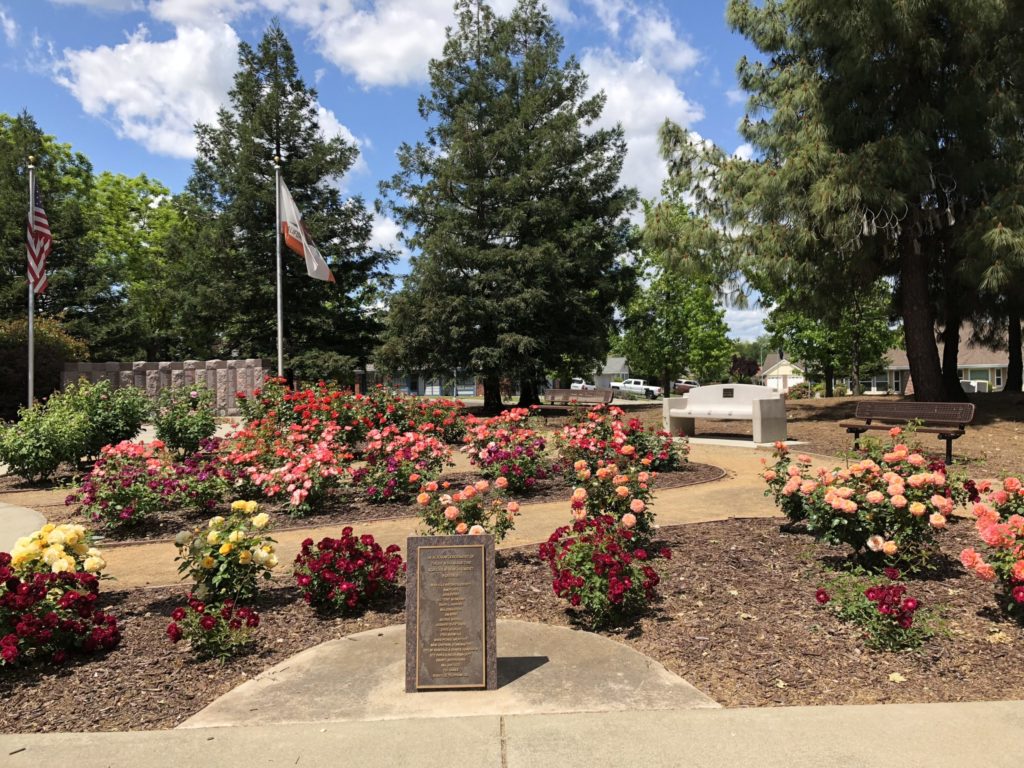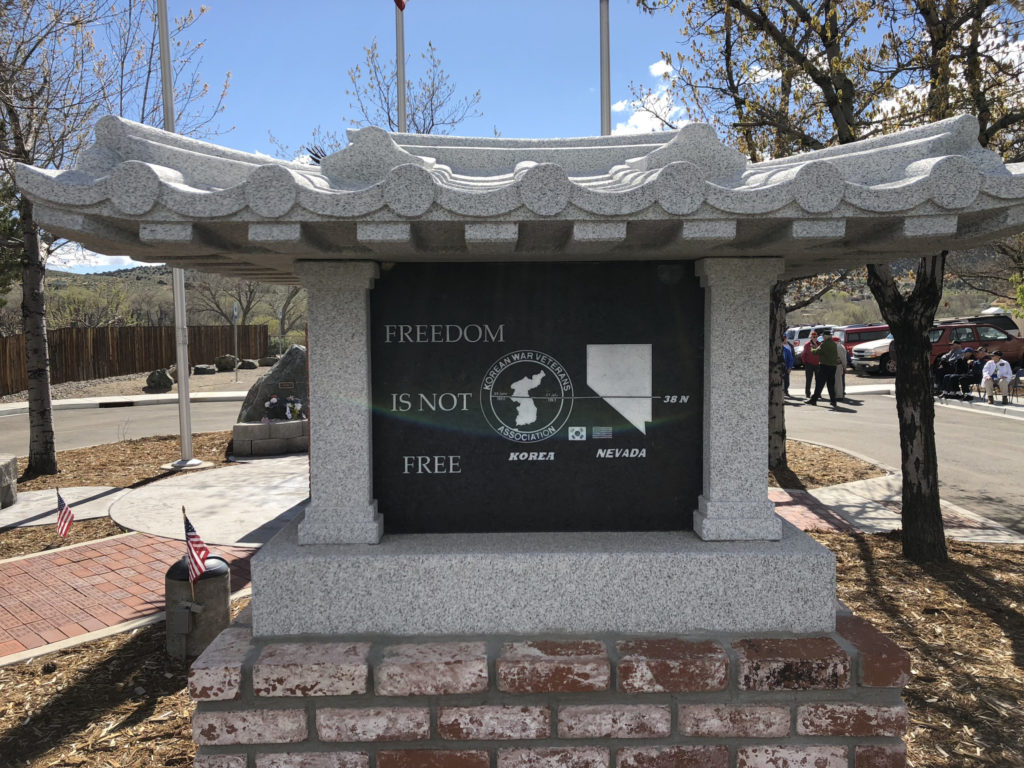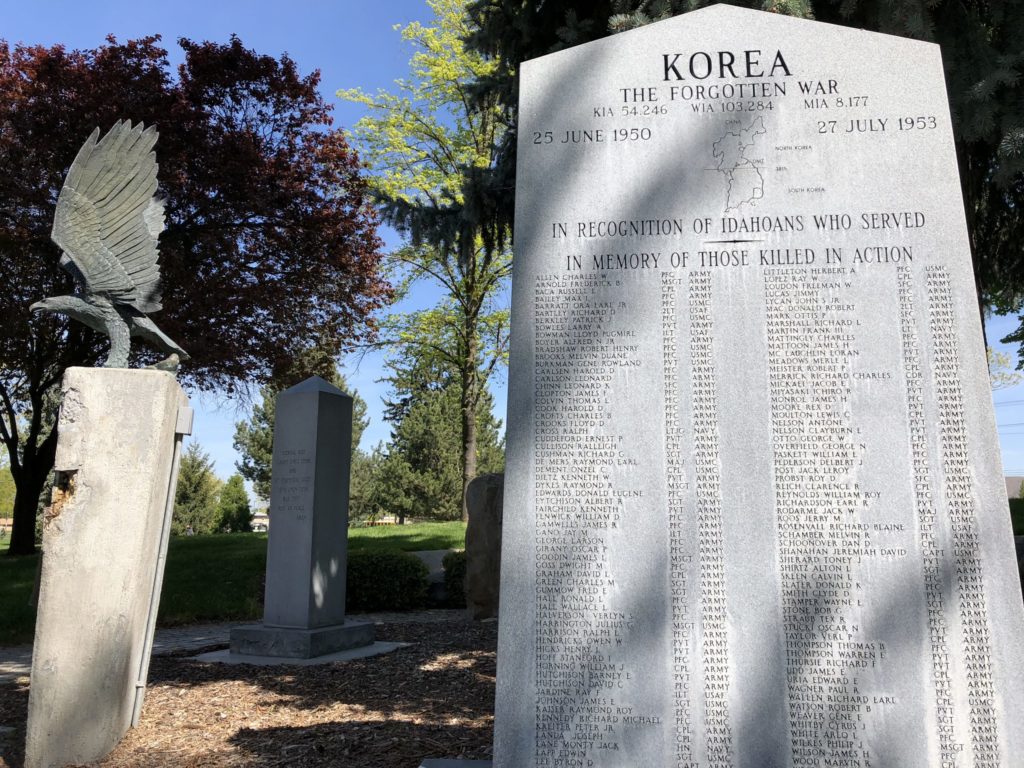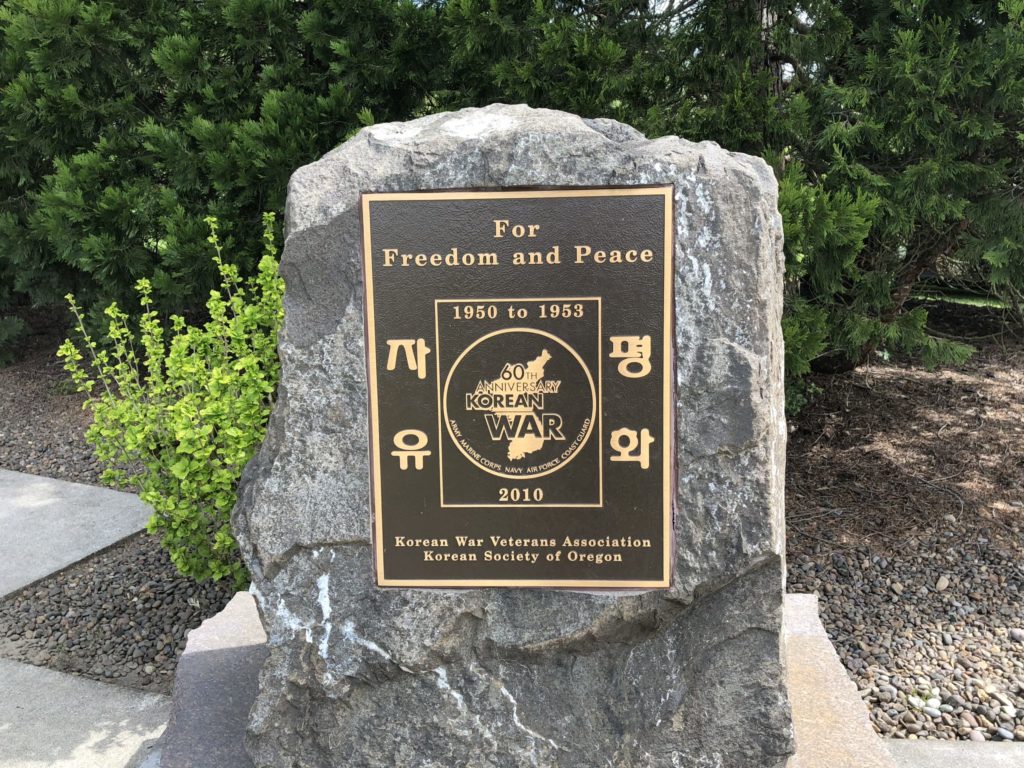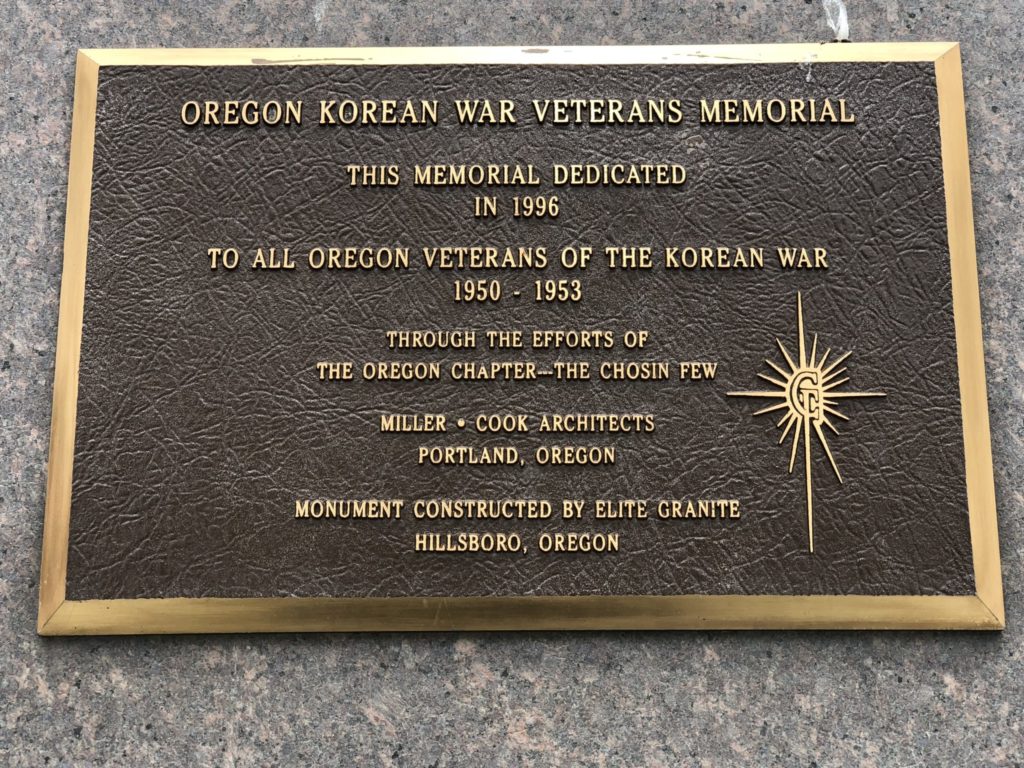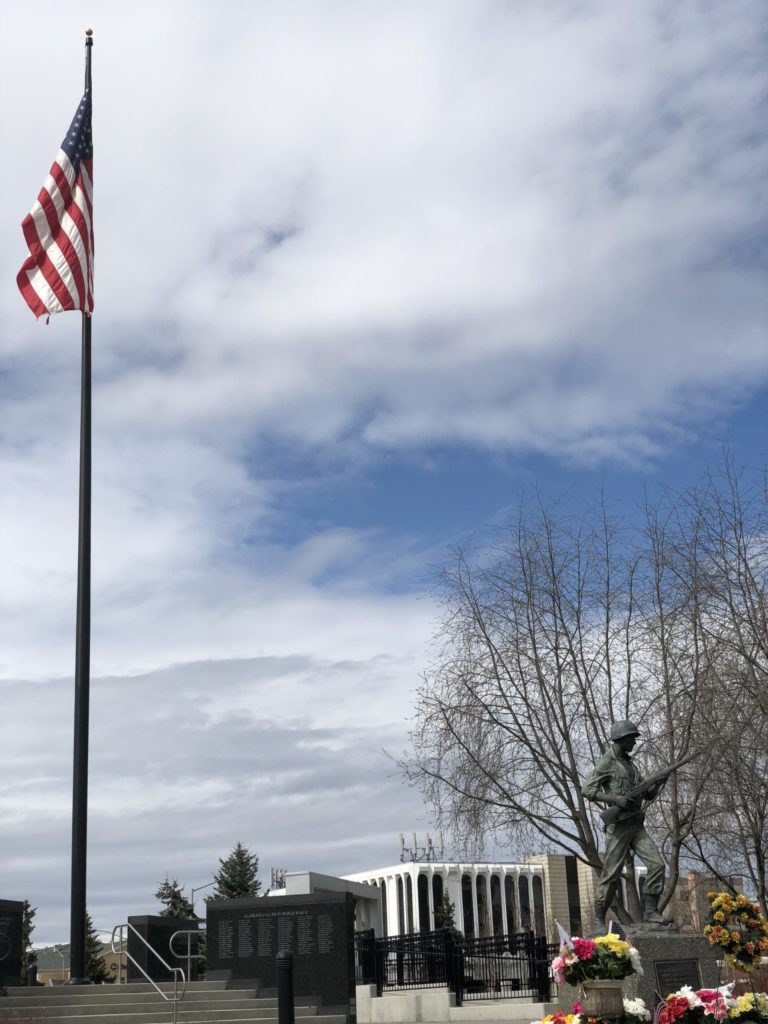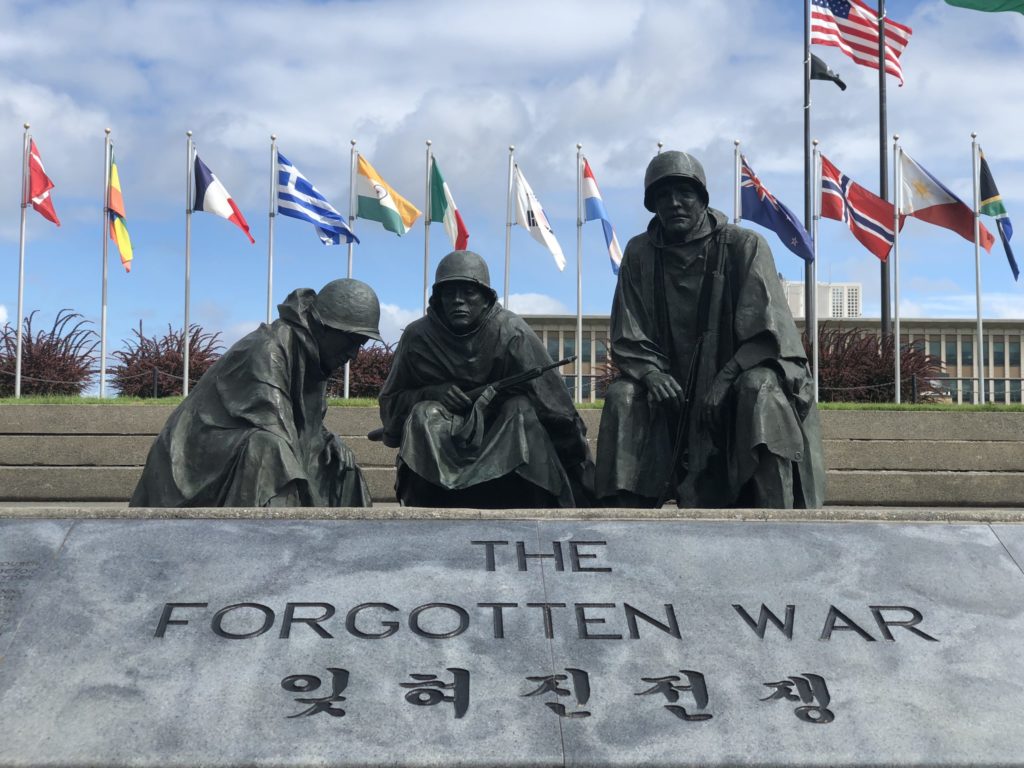주요 이야기
[HABLA EN ALEMÁN].
– English.
– Okay, this [inaudible] says, “Welcome to the 65th Infantry Regiment.” This insignia here [inaudible]. [Inaudible] everybody, because the Puerto Ricans, our 65th infantry was [inaudible], and it’s still commemorated for the Korean War. And let me tell you, I talked [—–]. After 50 years, I went back to Korea, and I was so happy, because Korea today looks so [——]. [inaudible]. [inaudible[, and are waiting for people to remember us and talk about the 65th infantry regiment. It was amazing. I feel so good we have this display here. [inaudible]. It is me. And I’m proud to be a Korean veteran. And to the Korean people, Salaam-Alaikum. [Inaudible].
– … of us, you know. We’re so grateful to you as well, you know? I’m so happy you said that we [—–].
– God bless.
– Thank you.
– Anita?
– Anita, my granddaughter.
– ANITA. SÍ, SÍ, ANITA, SU NIETA.
– MI NIETA.
– SÍ.
– COREANA.
– SÍ.
– QUÉ BUENO.
– So, snow… I have, because [inaudible] in the United States, but we had two enemies. The enemy and also the snow, because it was really, really cold, and some of our men had to be amputated, because they got gangrene for the cold. And I tell you, it was terrible. But we made it, and, some of them… we have the man in Puerto Rico, who’s half maim. We had to amputate his legs.
– Frost bite.
– Frost bite, yeah.
– How many died, how many were killed in action?
– Wow. Too many.
– 70%.
– 70%?
– 17.
– 70. 7 – 0. 70% of the Puerto Rican heroes were killed in action.
– 70?
– 7- 0.
– My uncle, which was a soldier with the 65th infantry.
– How many…?
– I’ll look it up.
– 70%.
– But the round number… 70%.
– The funny thing is about my uncle, we never found out what happened to him, because…
– He’s MIA?
– I don’t know if he was a prisoner of war, but we never found his body.
– So he’s missing in action.
– Of course. As I already said, I’m going to dedicate my life for our veterans, because I miss my uncle.
– The records’ keeping at that time, remember…
– I know.
– There was a language barrier.
– I know.
– So… and there was a war going on.
– And there aren’t…
– So records got lost.
– And because the war hasn’t ended, you know, it’s difficult to identify the remains, or retrieve the remains. And so there are 8000 MIAs, POW in Korea, which is… you know…
– There might be some alive, but I doubt it, cause it’s such a long time. But I hope one day… they’ll return all these people to us. [—-].
– It’s something that’s very dear to my heart, so… Because the families will never know what happened to them.
– No closure.
– Yeah, no closure.
-Okay, my name is Thomas Lopez. I’m Puerto Rican, of course, and I’m part of the 65th infantry regiment. And let me tell you, they call me a hero, because [—-] the 65th infantry complete. [—-], because [—-] in Puerto Rico, they sent me some kind of… like a plaque, considering me a hero. It was not only Tommy Lopez, it was all the 65th infantry, represented. And when I went to Korea of course I’m going to talk about the cold, because it was really… the Puerto Rican, we’re not used to that kind of weather, and we had two enemies. The enemy and also the cold. And as a matter of fact, we have people, as I told you before, that became… A man in Puerto Rico that was half a man, because we had to amputate his whole legs. And a lot of them suffered the cold. [—-] being an infantry man, because we had to communicate in English, in Spanish. They sent me to school in Seoul, and I learned communications in Korea, and when I went back, I was [——-] for the big, big, big [—-] in charge of the 65th infantry regiment in Korea. And that made me feel so proud. But I’ll never forget those who still were fighting in Korea, because they were my people, and as A Puerto Rican I love [—-]. And thank you, thanks to you, Anita, because you make me feel so good, so happy. I wish you to continue learning with the 65th infantry, because we have to recognize [—-]. Personal recognition to Anita [….], thank you so very much. God bless. Okay, first of all, we should go up to the schools and teach our kids about the 65th Borinqueneers. A lot of people don’t ever recognize, no, when we’re in Korea, and in this personal memories that I still have should be distributed within the kids, to have an idea what it is to defend this great country, which is America. It’s my country too. I was born in Puerto Rico, but I became a citizen. When I was born in 1917, it was tough to be citizen, because we used to belong to Spain, and when they came to… the war between America and the other countries, we became citizens. [——] made us citizens. So I’ve been a citizen all of my life, since I was small, that’s right. But there’s one thing I’ll say. There was a smart kid [—–] and lifting the flag. There’s the [—-] reason the Puerto Rican flag, and wherever place I go, I make sure I take my flag too, because it represents the 65th infantry, the Borinqueneers. And this is why I want the kids to learn and to know the history, and love this great country. First, I’ll say thank you to the Korean people, because I love you. And also, such a big change made me feel so proud and so clean about Korea. The people dress so nice, everybody, [—-] people. And of course, [—-] before, we did the other… [—] and many evangelistic churches, and we’re happy we had a chance to some of them. [—–] was so happy that we were there.
– Well, you deserve to be treated like kings.
– Thank you.
– Hi, thank you, Hannah. Yeah, so, the 65th infantry regiment of Puerto Rico fought in every major campaign of the United States wars, from World War I to World War II and Korea. But they distinguished themselves during the Korean conflict. The Korean conflict was 3 years. The Puerto Rican regiment was a regiment sized military unit. So, they fought in 9 major campaigns, from the battle of the chosen reservoir, where they were the frozen chosen, to the evacuation of Hungnam, and most famously was the bayonet charge of February 2nd, in 1951, where 2 battalions of the regiment encountered the Chinese 149th division. Now, a division is made up of 10,000 men, and a battalion is made up of approximately 1,000 men. So, there are your contrasts. So the numbers were basically, you know, 10 to 1, right? 100 to 1. So they fought valiantly for 3 days. They fought so valiantly, that the order came down to fix… the order came back to fix – the memories came back – the order came back to fix bayonets. The bayonet was fixed to their rifles. The order was given to charge, and they fought almost basically hand to hand in a very ferocious battle. As the culmination of that battle, there was the sound of a bugle. The bugle sounded withdrawal. It was the sound of the Chinese bugle, which called their units to withdraw. Now, there were 7% casualties. They left no men behind. They brought back all of their wounded. They brought back the story of what occurred to their commanders, the commanders brought that back to us, and now we bring that story back to you. So, as a culmination of that distinction, that gallantry in the field of battle that even the enemy had to bow in respect to this kind of worthy opponent. So it took us approximately 65 years to bring attention to… the military, where they had to prove themselves, they had to contend not only with the elements and with [—-], but with a ferocious enemy. They proved themselves time and again in their ingenuity, in their gallantry, in their bravery in battle. And then even after such, here, 65 years later, I gather together the remnant of these veterans to be in the 65th infantry on a task force, to help educate the public, help educate the congress, to help bring attention to their magnificent story to the American landscape, which culminated in the award of the Congressional Gold Medal, which is the highest award that the people to the United States can give any military unit. and in their gratitude as well, the people of Korea, and the government of Korea, awarded each of the Korean veterans this friendship medal, and also the Ambassador for Peace medal, so…
– Smile! Look here!
– My name is Domingo Pelliciel. I was in Korea in 1951.
– Look at me, look at me.
– Not the camera? Oka, my name is Domingo Pelliciel Febles, and I was in Korea in 1951. When I went to Korea I was 21 years old. We landed in Incheon. In Incheon, the ship [—-] stayed out the [—-], and then we go out through [—-], down to the small landing boat to the shore. From there, we went into the train. That train had [——]. There were two trains, one go in front and one in the back. So we went to Seoul. From Seoul we went to the frontline. [—-]. I was witrh the 63rd infantry regiment [—-], rifle man. And in Korea, I thought that was in the end of my life. I was in combat over there, with the infantry, and [—-], one time I was on patrol, and then the American airplane was bombing the Chinese, and then they thought that we were North Korean or Chinese, and they came to us. To bomb us. So I have a piece of cloth. This color. Yellow. And red. So the captain said, “Open the cloth.” So I opened it and the plane went out, because that showed that we were friendly, we were no enemy. So they went out. Another time, while I was in Korea, I was on [——], I saw a lot of people moving in the back, but to [—-], so I took a hand grenade to throw the hand grenade, and behind me there was a piece of… maybe a tree, and it my hand. So they hand grenade went out, so [—-] in the hole, so I jumped inside the hole. I jump, and then… If I stay up, my face would’ve disappeared from my body. One time, I was doing a hole up on the hill, and then, when I was doing the hole, there was snow, and the snow jumped, and the Chinese… I don’t know if they were Chinese or North Korean, they were watching me with binoculars. And then… I hear the mortar come to me, and I started to run so I go in the ground and start rolling like a boulder down the hill, so thank God. If I stayed up, they’d keep shooting me, but when they see me falling through the ground they stopped shooting. One time also I was with my friend, who was laying a barbed wire, and then the wire hit the fray, when you hit the fray it lights up, and the wire hit the fray, and the Chinese, Chinese or North Korean, I don’t know, they were looking and started shooting with the mortar, and my friend was wounded in the back. So thank God there was a hole in front of me. I jumped in the hole and they shoot my friend like 3 or 4 times. My friend was my Corporal. He was with a Korean soldier, a Korean company. They called it rock, right? Yeah, with a Korean company. So we had to translate from Korean to English, so we had Korean in the company.
– You remember his name?
– [—–].
– Amazing that you can remember them. Did you ever meet them?
– No, no.
– Maybe…You’re going to go to Korea next month, maybe you could find them.
– Maybe I find them. Maybe they’re dead right now. Maybe. who knows.
– No, maybe not!
– It was many years ago. It was 1951.
– That would be wonderful if you could find them.
– One time we were on patrol, and we walked, walked, walked, walked, and then the guy said, “[—-] we have to find the company. Please go back to the company.” So the… I’ll say the enemy, because I don’t know if they were Korean or Chinese. They were waiting for us. So this is the gate. we’re walking, so we stop over here and we say, “let’s go back.” and they started shooting with machine guns. They’re waiting for us to be right in front of the machine gun to start shooting.
– Did you get wounded?
– No, thank God I didn’t. Thank God, because my mother was praying for me. She was praying to Virgin Mary and Jesus. To Jesus. Saint Jesus. I went to Laos…
– GRACIAS A DIOS…
– They’re shooting, but I came out alive. Also, when I was on patrol, we used to see a little paper with [—-] propaganda, propaganda like writing in the paper, and the paper said [—-], “Go back to your country. Your family is waiting for you. Leave Korea for the Koreans.” In the paper. I used to look at the paper and say, “Oh, my God.” They have a soldier dead on top of the barbed wire. [—], “down.” but, forget about that.
– I’m so excited you’re going to get to go to Korea for the first time, right?
– When, now?
– Next month.
– No, second time, because I was there.
– Oh, second time!
– No, no. First time I was in combat.
– Oh, yes!
– Now I go for pleasure.
– Yes. I’m excited for you.
– I go for pleasure, for that time I was in combat.
– I’m so excited. Maybe I can meet you there.
– Oh, I hope so. I hope so.
– Yeah. Okay. What do you want to say when you go to Korea?
– Thank you, Koreans. Thank you.
– No! We thank you!
– Oh, yeah. Me too, me too.
– Why?
– You say it to me, I say it to you too.
– You don’t have to thank Koreans.
– No?
– No. We thank you, right?
– Well I say welcome. You’re welcome. You know, i was in Korea, I was in the hospital, in [—], in the hospital. From the frontline I went to sea, and they put me in the hospital, and the nurse was Korean. She shaved me, washed my face, my arms. Then [—], I keep sick, so they sent me to Busan.
– Swedish Field Hospital.
– Yeah.
– You went to Swedish Field hospital?
– There was a ship, a big ship.
– Yolandia.
– Yeah. In Busan. How do you say, Busa or Busan?
– Busa.
– We say Busan.
– Busa. You went to Yolandia, the ship?
– Yeah, I think so.
– Cool. I went…
– It was a big ship. [—-].
– I visited the Danish veterans.
– Oh, yeah?
– Yes.
– But that was their ship?
– Yes, Yolandia.
– Yeah. It was in the port of Busan. Right there. So I stayed there for one week, a couple of days, then they sent me back to the frontline.
– GRACIAS A DIOS, GRACIAS A DIOS ESTOY PORQUE DIOS LO QUISO ASÍ.
– Thank you. I pray that you will continue to have a lot of…
– Also, I have a friend of mine, rest in peace, his name was Pedro [—], from Puerto Rico. He was in Korea for 13 months. They told him, “You go back to Puerto Rico.” in for days. So one night we had to go on combat patrol, on combat. And then he said to the captain – the captain was American – “I’ve been here in Korea for 13 months. You [—-] the company, so I can go back home.” He said, “I don’t care how much time you’ve been in Korea, you have to go to fight. You’ll stay in the company.” And we went to combat, and he was killed. One bullet in the chest.
– Well, thank you so much. I’m so glad you are not…
– 2004, ¿no?
– Un poco…
– Más alto.
– Sí.
-Doménico Adorno.
– Sí, cuando, cuando, ¿participaron en la guerra?
– Nací en el pueblo de Trujillo Alto. A los 21 años fui reclutado por el ejército. Me enviaron a su país, Corea. No tengo buenos recuerdos. LO que tengo es un sentimiento porque muchos han ido ahora y dicen que Corea está muy pero muy alertada, muy avanzada, pero todavía en mi vida no capto, todavía yo tengo a Corea de 66 años atrás. Yo estuve en Chon todo el tiempo. Estuve en una oficina del tercer batallón. La oficina pertenecía al 65 de infantería. Estaba localizada en una universidad que había sido destruida por los americanos para sacar al enemigo, a los coreanos… metidos. Tuvieron que bombardear ese edificio. En ese edificio había partes que se podían usar, y ahí estaba yo en una oficina. Yo estuve 13 meses, un año y un mes. Mi trabajo allí era que me enviaban el informe, informe todas las mañanas de los muertos, de los desaparecidos, de los heridos durante la noche del cuerpo del 65 de infantería. Había mucho conocido mío. Todos eran puertorriqueños. Para mí era un dolor, aunque no los conociera físicamente, pero eran mis compatriotas. Eso es un dolor que llevo, ¿entiendes? Porque todavía conozco descendientes, descendientes de esos muchachos que perdieron la vida allí. Cada vez que los veo me traslado a Corea. Esa es la parte primordial del viaje a Corea. Bien, tengo otros recuerdos mucho más tristes del pueblo coreano.
– ¿Visitó a Corea el año pasado?
– No.
– ¿No?
– No, voy a visitarla.
– ¿Vas, vas visitar el mes de septiembre?
– Sí.
– Ah, ¡ok! Sí.
– Pues aquel tiempo ustedes no habían nacido.
– Sí, sí, sí.
– Fue un tiempo triste para Corea. La guerra destruyó la manufactura, destruyó la agricultura, y Corea vive… de la agricultura, de la pesca, bueno. Recuerdo, por la tarde cuando yo salía de la oficina, se había todo empolvado porque los edificios son hechos de un material, no recuerdo ahora, que es como tiza. Salía afuera. Había un, una reja para no entrar al edificio donde estaba la oficina. Nosotros pegábamos allí… y eso… triste ver cómo las mamás…
[HABLAN EN COREANO].
– Sí, sí, sí.
– Lloraban pidiendo comida, y muchas veces hacían cosas indebidas, cosas indebidas con sus hijos. Yo tengo mis hijas ahora, mi nieta, y eso me lleva, ver un pueblo destruido físicamente…
– Sí.
– Y moralmente.
– Sí, pero ahora es muy…
– Eso es distinto, pero yo no lo he visto.
– Sí. Gracias.
– My name is Carlos Pena Lozano. Okay. I went to Korea in 1951. I landed in Incheon through Yokohama on a small boat. We have sweet water at [—-] and saltwater. And we were to Incheon. The port of Incheon was in flames. I was a kid. 17 years old. I guess most of the kids in this island joined the army on those days because [—-], and it was showed to the world. So we went to the [—-], up on the mountains. I got wounded there. I shot two times. I [—-] the [—] river, and we got frozen. [—-] the Chinese. And you know, they started firing at us and everybody ran. But after that, a few months later, I was shot in [—-]. They said I was dead because I dropped in a creek, a frozen creek. The next day, a Korean peasant saw me and I was almost dead. They took me on a helicopter to Gimpo, to our base. I found out later that the Puerto Ricans operated me, and from there on, I was sent to Japan for recovery and to the States. Later on I ended up on Panama, and I got discharged.
– I heard that you went back to Korea last year.
– Oh, yes. Yes. I would like to thank the people of Korea, the government, all the people there that treated us like, you know… I don’t know if we deserve that kind of treatment. Even my wife cried the day all those Korean officials came to greet us, and I was never treated better in my life anywhere like in South Korea. People are marvelous. I guess [—-].
– Well, you should’ve been treated like that, because we, the Korean people, are here because you fought there, you know? I wouldn’t be here if you didn’t fight there.
– I’d also like to thank [—-], real Korean people that, you know… [—–]. We never had that recognition we had, you know.
– Well, you should be proud.
– Oh, yes, I was proud that I went to South Korea and I met nice people.
– Thank you so much.
– I guess everybody in the 65th infantry regiment have all the Koreans in our hearts. Yes.
– Thank you. That’s so sweet.
– The first thing that comes to mind.
– The people. The people.
– And what kind of people are they?
– Fantastic. They are nice people. Nice, nice. I guess that every time that I travel and go anywhere, people would do… [——] in South Korea. I’m talking for all the Puerto Ricans that have gone there, and I guess everybody that’d been there, so it’s your people. Really good.
– Mi nombre es Carlos Josué González Mercado. Todo el mundo, las amistades y mi familia me dicen Josué porque mi papá se llamaba Carlos. Y antes de yo ir a Corea, trabajaba con la autoridad de Energía Eléctrica, y estaba a cargo del pueblo de Río Grande. En aquella época los pueblitos eran pequeños. Río Grande tenía 400 abogados y yo estaba solito a cargo de ese pueblo, pero empezó la guerra de Corea y, a pesar de que ya yo tenía 23 años, fui llamado obligadamente a servir en el ejército de los Estados Unidos. Recibimos entrenamiento en el campamento de Tortuguero en Vega Baja. Y a los 3 meses de recibir el entrenamiento zarpamos para Corea en un barco que se llamaba Sargent… Viajamos de aquí a Panamá. Cruzamos el Canal de Panamá. Llegamos a California. De California seguimos a Hawái. De Hawái llegamos a Japón. De Japón definitivamente llegamos a Corea un mes después. Salimos de aquí viernes santo de 1951. En Corea me asignaron al 65 de infantería como uno de los primeros refuerzos que fueron al 65. Había otros tres regimientos americanos, dos regimientos más americanos. Era el 7 y el 15, pero el único regimiento que era de puertorriqueños solamente era 65. Era un regimiento segregado de solamente puertorriqueños. Bien, naturalmente, nos unificó más como pueblo, como amigos, como compañeros, porque al fallecer uno nos dolía a todos. Y fue un año completo en que estuvo en la guerra de Corea. Si ustedes me permiten dar un testimonio de la grandeza del Señor. Mi mamá, cuando yo fui a Corea, hizo una plegaria pidiéndole al señor que no permitiera que yo con mi arma de reglamento matara a ningún semejante mío, una petición que para cualquiera es imposible porque a nosotros nos adiestraron para matar, para matar gente, y pedirle a Dios que un hombre que lo mandan a matar gente no mate a nadie eso es una escala muy alta. Ella también le pidió que preservara mi vida. Y durante ese año que yo estuve en Corea, al yo llegar, perdóname, al yo llegar a Corea, el comandante de la compañía donde yo estaba, vio mi récord y decía que yo era lineman, procurador de líneas, que tiraba líneas, conectaba teléfonos, y hacía instalaciones, y hacía bregar con los switchmodes. Y dijo al sargento: “Este es el hombre que necesitamos para conectar los teléfonos de la compañía de regimiento”. Y mi trabajo en Corea, donde un año, por un año fue conectar teléfonos y operar swichtmodes. Por lo tanto, mi mamá no puede testificar si yo maté a nadie, pero yo sí puedo testificar eso porque debido a ese trabajo que tenía, de mi rifle no salió ni un solo tiro, o sea que no pude haber matado a nadie. Y hay que darle gracias a Dios. Por esa oración de mi mamá que le pidió a Dios eso, y Dios oye a los corazones contritos y humillados que se doblegan ante… Por eso yo donde quiera que voy, y me preguntan, doy mi testimonio de la grandeza de Dios que me permitió regresar con vida sin tener que matar a nadie y servir en el ejército sin tener que cometer ese roll.
– Sí.
– Dios me los bendiga.
– Sí, sí. Gracias, gracias… Su Abuelo es un pastor, ¿no?
– Mi papá.
– Papá. Yo también.
– Este es mi papá, mi mamá, 9 hermanos.
– Oh, my God! 1, 2, 3, 4, 5, 6, 7, 8, 9?
– We were 10, but one died very old.
– Where are you?
– I am the 3rd one. That’s the oldest, 2nd and the 3rd. This is 4th, 5, 6, 7, 8, 9.
– Wow, bueno, el señor da a su familia muchos, muchos…
– Todos, toda la familia sirve al señor, toda la familia. Mi papá y mi mamá nos enseñaron a amar a Cristo por…
– Gracias.
– Esta fotografía fue tomada cuando mi papá y mi mamá cumplieron 60 años de casados.
– Wow, 60 años. Gracias muchísimo.
– Dios la bendiga.
[HABLAN EN COREANO].
Thank you.
[HABLAN EN COREANO].
– …
[HABLAN EN COREANO].
– Which battle did you fight?
– … una pelea, ¿verdad? Estaba encargado solamente de…
– No, no.
– Pero mis tíos fueron a pelear también y donde yo peleé, pelearon ellos, uno de ellos murió en mis brazos, lo enterré y regresé de nuevo, pero yo sé lo que es un hijo cuando está guerreando, cuando se manda a sitios a pelear, donde uno ha estado pasando… Y pasando malos tragos en la guerra. Así que yo también siento como padre y como hijo, siento como hijo porque sé lo que sintió mi madre, sintió mi padre cuando yo partí.
– No.
– Y nosotros, nosotros apreciamos todo el esfuerzo que hacen por nosotros, somos, fuimos soldados y somos soldados porque el soldado una vez sigue siendo soldado todavía, pero siempre hay alma.
– Sí.
. Hay agradecimiento y amor. Okay.
– Y gracias muchísimo, padre.
– And there’s a picture…
[habla en coreano]
– Poema, un poema dedicado a las mamás de quienes tienen…
– Hijos.
– …hijos que participaron en la guerra.
– En la guerra.
– Sí.
– Sí. Ya.
– Anita me pidió que recitara esta poesía, yo se la regalé a ella y le voy a regalar también el libro que escribió mi mamá cuando yo estaba, eh, de poesías, ella escribió. Pero la primera poesía que está en este libro es la que dedicó a todas las madres que tenían los, los hijos en la guerra y esta se la dedico a mi querida nieta Anita con, de Corea de su abuelo boricua Josué.
– Gracias.
– Dice mi mamá de la siguiente manera, una plegaria que ella compuso en forma de poesía pidiéndole al Señor que preservara mi vida y que no permitiera que yo, con mi arma de reglamento, matara a ningún semejante y decía ella de la siguiente manera: “Señor, ¿qué te daré si me traes a mi hijo, Señor? Que se han llevado a la guerra maldita, aquel infierno. Señor, ¿qué te daré? Si nada tengo, pero tú eres bueno, Señor, y guardarás su vida. Señor, ¿qué te daré? Yo nada tengo que te pueda ofrecer por su pronto regreso. Señor, ¿qué te daré? Si mi alma está triste, muy triste, y nada soy y nada puedo. Por las noches, Señor, sin querer me desvelo, por el día, Señor, al infinito vuela mi pensamiento para pedirte, Señor, que cuides a mi hijo, que está lejos, muy lejos. Señor, yo le enseñé a mi hijo las sublimes palabras de tu santo evangelio, donde el amor nos une en vínculo perfecto, haciendo una familia de este gran universo, que los… Señor, eran sus hermanos buenos, la raza amarilla, los blancos y los negros, sin distinción ninguna, teníamos un padre bueno y ese padre, señor, eras tú, amante y sempiterno, que tú eras padre amoroso, sublime y tan tierno que, por salvar al mundo, enviaste de su gloria a Jesús, el, el Dios, el, el unigénito. Señor, se han llevado a mi hijo, a mi hijo, Señor, que es amante y muy bueno, para enseñarle, Señor, a matar a sus buenos hermanos de este gran universo. Señor, mira mi angustia y oye mi ruego, permite que mi hijo, Señor, que es tan bueno, no use su espada para matar a su hermano, el cual tú has hecho. Señor, permite que allí tú estés en medio de ellos, protégele sus vidas, pues, son tus hijos, cuida de ellos, en ti yo espero, únelos con tu amor inmenso y del campo de batalla, Señor, que salgan ellos para proclamar el amor de tu santo evangelio. Señor, yo te imploro que cuides a mi hijo y también te pido, Señor, que cuides de aquellos que dicen que son malos, pero yo no lo creo, ellos tienen sus madres, que llevan en sus pechos el amor de sus hijos y el corazón deshecho. Yo sé, Señor, que tú los amas como amas a los nuestros, son tus hijos, Señor, unos y otros, tú eres nuestro padre y padre de ellos. Señor, haz un milagro, yo nada te ofrezco, pues, nada tengo, pero, Señor, haz un milagro, trae la paz al universo, en cambio, las madres de este mundo te ofrecemos lavar, no ya tus pies, sino todo tu cuerpo con lágrimas cristalinas que salen a raudales de nuestros vellos. Dios les bendiga.
– We were fighting in Korea. They’re doing a Korean Wonsan. The city’s infantry saved the American regiment. The Marine. For when the… came, they had to from Hungnam to… road. To go to the way because there were too many Chinese. They had to go the other way. They stopped the Chinese… the American gave into the war.
– Who fought in the, uhm, Hungnam evacuation?
– ¿A dónde?
– Fue que en el 50.
– ¿En el 50?
– …tuvo que agarrarle.
– En el 50 estaba allá.
– I went in 1951 until 1953. I went to the Geochang course. I go to different companies. I was the battalion company. Company I, second platoon, second squad. In Korea. Everynight… And I was the Army… with my company. Combat payment. Make the patrool everynight in Korea. Papas… She was my. Too much mine. Explosion.
– ¿Usted fue un policía militar?
– I was infantry over there.
– ¿Qué recuerda?
– ¿Qué recuerdo, qué recuerdo de allá? I was in the attack in… hills. Maybe you don’t remember.
– No.
– In Kelly mountain of Kelly hill. We fight over there in the mountain for three battalions. First battalion, second battalion and third battalion. First battalion about all the… battalion. Not all complete. Too much died. Killed. Too much killed over there in the mountain, and the second battalion, killed too. And the third battalion,… my captain said, “Two more dead, two more injuries.” So, we go to the mountain down.
– ¿Qué es el nombre de la batalla?
– Kelly hill. Three battalion. Right over there. – ¿Dónde?
– ¿Dónde fue esta batalla?
– En Corea.
– Sí, sí, sí, pero ¿el sur o no?
– I don’t remember the… You know. I was a debutant.
– Sí, sí, sí.
– In Kelly hill. The mountain is Kelly hill. The mountain.
– Korea Hills? Kelly?
– Kelly hill.
– Kelly hill. K-E-L-L-Y.
– Kelly hill.
– Kelly?
– K-E-L-L-Y.
– Kelly hills.
– Kelly hills.
– Yo estudiaré. ¿Sí?
– Sí, sí, sí. Y ¿qué, qué piensa usted de regimiento 65? De la legacía del 65.
– 65 pelió mucho allá en Corea y batalló mucho allá, mucho, batalló mucho.
– Muchísimo, ¿no?
– Mucho, muchísimo.
– ¿Por qué?
– I don’t know. The enemy took…
– ¿Cómo se llama? El terreno.
– Sí, sí, sí.
– El terreno. The mountain, the land, everything. The enemy took the…
– ¿Ustedes piensan que el general…?
– El general Cordero.
– ¿Qué?
– General Cordero nos metió allá.
– ¿Cordero?
– Cordero. Sí. General Cordero, eh…
– Three battalions. He make one… meeting in the yard over there. You can take the mountain in… You can take it. The mountain, the… You can take it. …the mountain. What? Okay. We go over there. No good. Too much dead. Too much injured. Too much killed. In the mountain, Kelly was the… Mongolian. Big one. The Mongolian and Chinese and Korean. North Korea stays over there too.
– Pero el regimiento fue segregado, ¿no?
– When we go back from the mountain the other day. We’re going to take the low weapon in the mountain. Too much weapon. And looking at the injured, the dead, too much people. Too much soldiers dead.
– Pero, pero el regimiento 65 solo, solo puertorriqueños, ¿no?
– Puertorriqueños, sí.
– Sí.
– Eh, después más tarde nos…
Attachment American soldiers in different company, Puerto Rico. Over there in Korea. The company… in different company attached the captain, the lieutenant to take out the…
– …eh, esto de, ¿cómo se llama? De que… los que… que venían de allá.
– Officer, American officer, attaching different companies. Attached my company, one American captain, I don’t remember now the name, he not believed me Puerto Rico. The American don’t believe me. The American captain don’t believe I’m Puerto Rico. When he go to the patrol and the scout take… the captain over here, this way. And the captain, I remember, because the captain said, “No, you have it the wrong way!” Company over here, this way. I don’t know. He walked to the patrol to the recognizant patrol, the enemy is approaching towards mine. I’m a soldier… Sergeant Rodríguez from… Puerto Rico. He exploded dead to the mine because the place is too much mine, you know? I remember the… I pictured it in my mind.
– Guao.
– Yeah, every…
– I’m your master of ceremonies during this event. We gather here today to present a flower wreath in honor and gratitude by… to the fallen soldiers of the Korean War buried and memorized in this cemetery, and to thanks the family members for their sacrifice. Please, stand up if you can. For the… in honor of our fallen heroes.
Please, be seated. We would like to thank the presence of Mr Glenn Power, deputy undersecretary of the. President of the Korean-American association of Puerto Rico. Member of the Remember 727 Organization for Korean War Veterans. Ms… President of 65th Infantry veterans. Member of the 65th Infantry divisions were engineers, family members. And now we have Mr. …. director of the Puerto Rican National Cemetery with a short message.
– I’m going to… I didn’t know I had to give a short message. But another things, uh, thanks him for actually taking time and making this possible. I’m very proud of the 65th Infantry … for their service in Korea, World War II and other places. They went to Panama, all the places that they served. And I was just talking to Mr. Glenn Powers about how all this as a society in Puerto Rico. We don’t give the honor to our servicemen. So, I think today with this short, small ceremony, we are honoring our Korean veterans and all that… year. And, also, the veterans that we have here and… all our respect. Thank you for being here. Thank you for what you’re doing. And welcome to our cemetery.
– Now we have Ms. Hannah Y Kim, member of the 727 Organization for Korean War Veterans.
– Gracias muchísimo, ah, por su hospitalidad y su dedicación de, para mis abuelitos. Yo soy, yo me alegro muchísimo porque yo estoy aquí porque ustedes fueron allí en Corea y yo estoy aquí con ustedes y mis abuelitos, quienes pasaron sacrificios últimos. Y no solo estoy aquí, estoy aquí con todos los coreanos, como presidente lee y representante de corea, porque no, ellos no pueden, ellos no pueden venir aquí, sí, y por eso yo estoy aquí para decir a ustedes gracias muchísimo, para todos. Y nosotros, coreanos americanos, como yo, y coreanos en Corea y coreanos en todo el mundo, nosotros disfrutamos libertad porque ustedes fueron en Corea y nosotros nunca, nunca olvidaremos. Gracias muchísimo, gracias, Javier, y gracias muchísimo.
– …and Mr. Javier Morales… Mr… to honor with your presence and… To place the flower wreath in honor to our… in the Korean War.
– …mis abuelitos. Gracias.
– Pueden ir todos, por favor.
– Sí.
